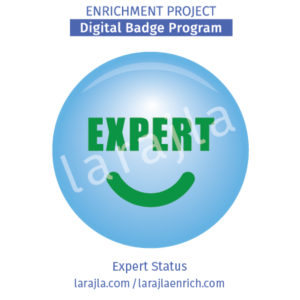
Often, adults don’t understand why they need to volunteer and help others. They also don’t see what they can contribute. This badge will help you answer these questions so you can start a conversation with others about what they know and how they can help.
Follow this badge program with “Youth Volunteer” go dig deeper into actual volunteering with kids.
Steps
1. Expert.
Many people feel they are not an expert and, therefore, cannot volunteer to work with kids and adults. An expert isn’t someone who knows everything about a subject. An expert only knows a thing or two more than someone else. For kids, it’s easy to know more than they do on a subject. Look at the following steps and note down those things you know well and could share with others.
2. View.
You learn a lot of new things that quickly become the norm for you as part of your everyday life. Just because it’s “normal,” it doesn’t mean others don’t want to learn what you know. Look at your expert status from the view of someone who knows little or nothing in the areas listed below. After making your list of things you can share, try to write down a half-dozen things that others are unlikely to know.
Your Expert Status
3. Fun.
You can share the things that you consider fun. This includes your crafts, hobbies, sports, games you enjoy playing and more. It might be rules or history. Perhaps you figured out a trick that others don’t know. Write out those things you have been interested in and can share with others.
4. Career.
As part of your career and work, you acquire skills over time . . . even if you’re not taking formal classes. Discussing what you do helps others see more possibilities for themselves. Knowing how to troubleshoot a computer or create files that can be shared worldwide might not seem exciting, but anything that expands someone’s worldview of how things work contributes to their success. Note any skills or knowledge you could share around your career or job.
For example, I took a Girl Scout troop to our local credit union. They learned about different types of bank accounts, identifying fake money and the importance of saving. The girls were excited about what they learned. If you work at a financial institution, you might not think basic finance is a subject kids want to learn about . . . but they do!
5. Culture.
For some people, their culture is very important to them and they’re happy to continue traditions with their children. My family is not one of those. I have very little cultural knowledge about my family. For this reason, cultural events grab my interest. Why wouldn’t it be the same for our kids? Understanding different cultures allows us to communicate and understand others. You might start out with recipes and move into beliefs and traditions. What cultural traditions do you hold dear that you might be able to share with others?
6. Family.
While family might come under culture, I want to take this a different way. Family life is different for every family. A family may have one parent or two . . . or perhaps they don’t have any family members. A family may live in a house, apartment or even out of their car. How kids are raised is different as well. Add in work schedules, responsibilities, interests, etc. and you’ll see that each family life is vastly different. Compare your family life to others. What elements might you be able to share with others?
Here are two examples of my home life that might be different from yours . . .
I didn’t want to force rules on my kids, so rules that dealt with health and safety were the only non-negotiable ones. The argument and solution had to be reasonable, though. At 4-years-old, my oldest wanted to eat her soup on the carpet in front of the television. I told her no, explaining I didn’t want her to spill the soup on the carpet. I discovered her shortly eating her soup in front of the television. She had put down a towel and a tray, then her bowl of soup on top. When I asked, she stated that the tray and towel would catch anything she spilled and she made sure to bend down over her bowl. Since she had come up with a solution to my objection, I couldn’t argue with her and left her to eat her soup.
I’ve also told my girls that I didn’t want them getting jobs as long as they were going to school. When I was in college, I had anywhere from one to four jobs to pay for the cost. It was difficult keeping my grades up and working all the time. Days off were a rarity and I pushed myself through months of no downtime. My youngest is now in her third year of college and realizes that she has a lot of downtime to destress and work on her homework because she doesn’t have a job. She appreciates that she has time for herself.
7. Education.
Formal education can teach you a lot of things . . . both that you’ll need for your future career and the supplemental classes you take for a more “rounded” education. In addition, colleges and universities often offer additional classes outside of the curriculum that the community can participate in. From my local college, I’ve taken classes in self-defense, event planning, writing children’s books and more. Any of these are things I could teach. Look at your formal education and ask yourself what you can share.
8. Learning.
Learning through local organizations, online portals or even from friends sharing knowledge can add up to a huge list of knowledge and skills. Both of my daughters tested high on their ISTEP (state) tests and were invited to Northwestern University to learn about supplemental education. I took a workshop on tracking what kids learn outside of school as some schools will give extra credit or adjust their schedule because they’ve already learned something. Now, I only track my own learning so that I know where and when I learned something. I also save my notes and handouts electronically so I have access in case I want to share something I’ve learned. Start your own tracking list of things you know, classes you’ve taken and what you can share.
9. Teach.
A big part of the Montessori experience is the kids not only learn based on where they are, but they also teach those who are below them. This helps to solidify their knowledge. I have found this to be true myself. When I teach something, I learn even more about the subject. Have you taught or shared your knowledge with others? List those things you’ve taught that you could teach again.
10. Volunteer.
Volunteering is another area where a lot of learning can occur. Depending on your involvement, it might be programming, mentoring or even how the organization works. List things you’ve learned while volunteering that you can share with others.
Goals
11. Exposure.
The biggest goal is to expose others to the knowledge each of us possesses. By showing what you know to others, you make the world a little bigger. You make things that seemed impossible possible. You can help them see opportunities that they might not have seen before. My mentor says, “We can’t look for what we don’t know.” So, by offering to share your expertise, you can give others information to start asking questions and looking into things they might not even know existed. Have you had this type of experience?
Please be aware, everyone might not be interested, and that’s fine. I offer a free monthly craft class where I do beginner projects so people can try new crafts. I’ve had to cancel a couple because there was no interest or other things took priority.
12. How.
You can share your expertise in many ways, including volunteering and teaching, which were mentioned above. You can make it short or long term. For example, my craft class is 1.5 hours once a month. It’s not a huge investment of time for me or the participants. When I ran my girls’ Brownie troop, we did 2-hour meetings almost every week the school was in session. It was a lot more work for me, but it was right after school so it worked better for the families who participated. When you decide to share your expertise, you can choose how you share it. Look into Meetup, Eventbrite, local venues, local organizations, online course providers and YouTube to see how others share their expertise. Which ways would work for you?
13. Consistent.
Being consistent is necessary. After all, if you do a class next month and then wait a year, everyone will have forgotten about you. Create a plan where you can share your expertise, adding in a consistent element.
NOTE: Sharing your expertise may make you some money . . . or even become a career.
14. Do.
Try sharing your expertise. Start off small with friends and family. Do a one-time event for a church or youth group. As you become comfortable, try to scale up your sharing.
Badge and Supplement Files
Member Level
- 0EP_B_BPG_ExpStatus_2in_12up_MS1_larajla — generic badge printable
- 0EP_BLIST_ExpStatus_MS1_larajla — badge items per membership level
- 0EP_BSET0_ExpStatus_MS1_larajla —badge set and related badges
- 0EP_SUPP0_ExpStatus_Journal_MS1_larajla — badge journal
- 0EP_SUPP0_ExpStatus_Planner_MS1_larajla — badge planner
- 0EP_SUPPL_ExpStatus_MS1_larajla — supplements currently available per membership level
Supplement Fun
- N/A
Sites to Explore
- www.technkl.com/benefits-sharing-ideas
- www.lifestylebydesignstudio.com/expert
- daringtolivefully.com/become-an-expert
- happinessmatters.com/what-your-areas-of-expertise-are
- www.mirandanahmias.com/get-known-as-an-expert
- www.thenetworkniche.com/online-course-platforms
- www.skillshare.com
Get the infographic here > larajla blog post
Get the PDFs of the badge program / supplements here
